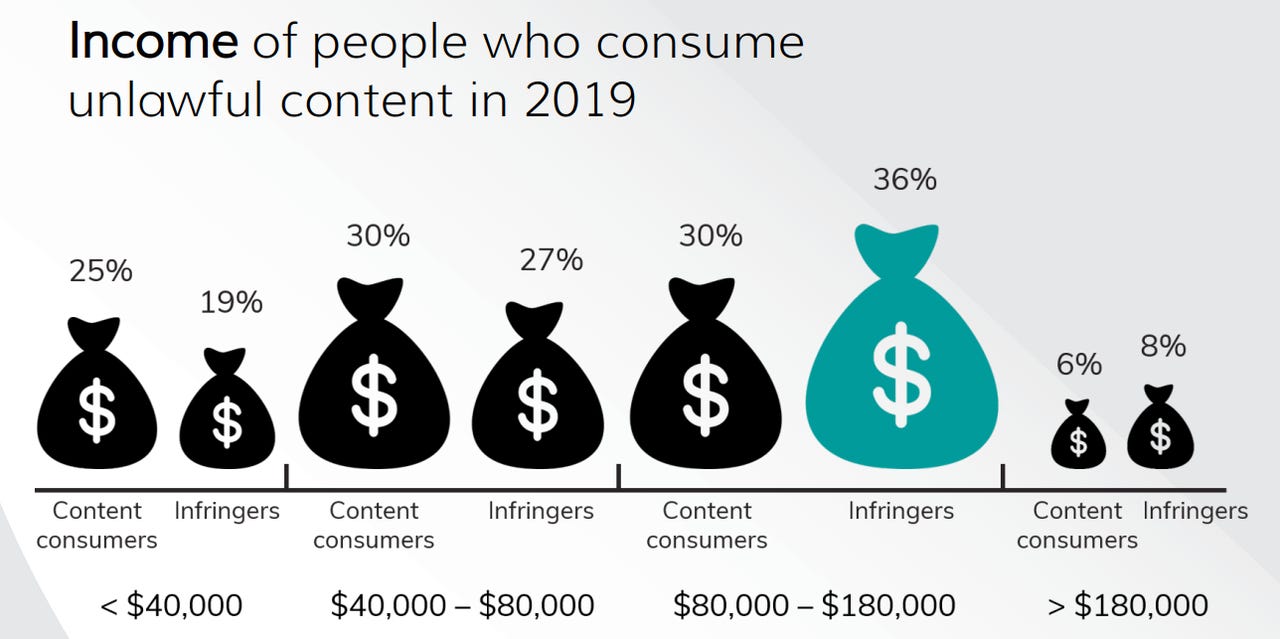Australia's middle class more likely to be pirates


Released over the Christmas break, the Australian Department of Communications Consumer survey on online copyright infringement 2019 has shown it is full time workers in good jobs that are more likely to pirate material.
The report found those who engage in copyright infringement were overwhelmingly male, by 74% to 26%, most likely aged between 25 and 44 years, that age cohort accounted for 63% of infringers, and 44% said they had a household income of between AU$80,000 and AU$180,000.
"Consumers of unlawful content were found to be either employed full time (37%), part time (18%) or students (19%). Those that were self-employed or retired were less likely to infringe," the report said.
"Income was an interesting factor; when compared to all content consumers, infringers were more likely to earn over AU$80,000 and least likely to earn less than AU$40,000."
Although released at the end of December, the survey was conducted in March across 2,463 individuals aged 12 and over.
A third of those pirating content said they would stop if lawful services were cheaper and available, 5% said that nothing would make them stop.
The report also showed the declining use of Apple's music offerings in Australia alongside the rise of Spotify.
While Spotify has risen from being used by 19% of respondents in 2015 to 54% in 2019, Apple's collection of iTunes and App Store music offerings shrank from 45% in 2015 to 32% four years later.
Over the same period, YouTube has hovered between 56% and 60% popularity, and Facebook has sat in a range between 23% and 26%.
For services used to access video games, the news was better for Apple, which alongside Google Play store topped the survey with 31% of respondents using it, while services such as Steam, Xbox Live, and Sony Entertainment Network all saw declining usage.
"Over the past four years it is evident that digital content consumers are increasingly paying for most of their content," the report said.
"While the increase in music is steady at 38% in 2019 compared to 39% in 2018, a significant increase is seen across the other three content types. Video games saw a 13% increase from 13% in 2018 to 26% in 2019. Movies increased from 31% for 2018 to 49% in 2019 and TV programs from 26% in 2018 to 34% in 2019."
The report added there was an increase in consumers gaining free access to content and then purchasing it at a later date.
The 2019 edition of the survey provided more data to the trend pointed out in 2015, that users who pay for content, but also infringe on copyright, spend more than users who only pay for content.
Asking respondents about encountering piracy-related website blocks, 58% said they would give up, while 37% said they would seek alternate lawful access, and 8% said they would seek alternate free but unlawful access.
Of the 7%, or 329 respondents, that said they would try to bypass the block, 44% said they would use a VPN, 21% said they would search for another site, with 20% going for a proxy, 15% opting for a browser extension, and 13% going through Google Translate.
While overall consumer spending on music, movies, and games declined.
Related Coverage
Village Roadshow wins court order to block 76 overseas video piracy websites
Telstra, Optus, Vocus, TPG, and Vodafone are required to block the sites within 15 days.
Subtitle piracy: Will it be enforced in Australia?
Roadshow has argued that pirated subtitle files infringe the copyright of literary works of screenplays.
Judge allows Roadshow to raise piracy cases quicker, blocks more piracy websites
A group of studios, headed by Roadshow, will only need to notify carriage service providers within two months, instead of six, of whether they want to renew blocks to websites that have been deemed to illegally share copyrighted content.
Foxtel could potentially block piracy websites without needing to attend court
In the meantime, Foxtel can only request for piracy websites through a legal battle or by getting an agreement from carriage service providers.
The number of departments in the federal government has been reduced from 18 to 14.